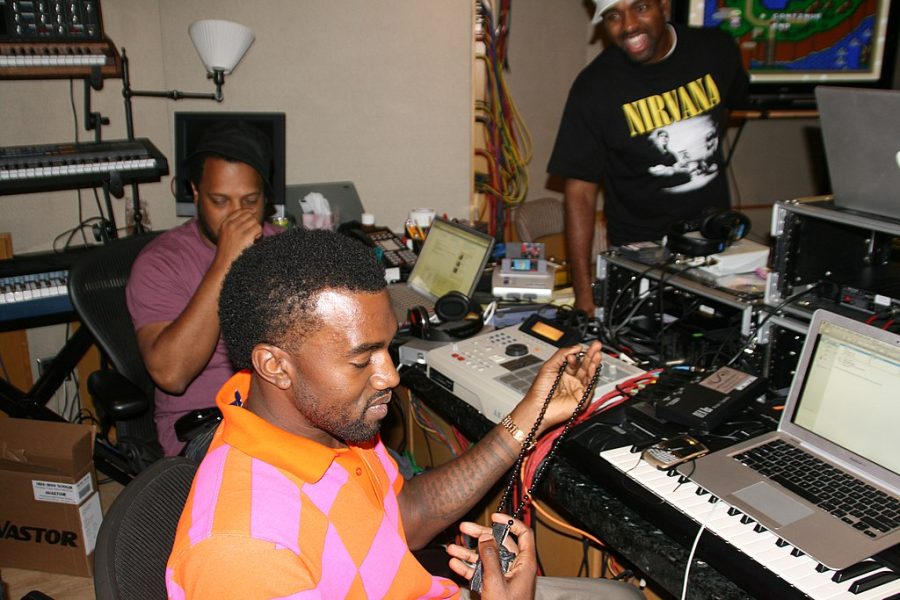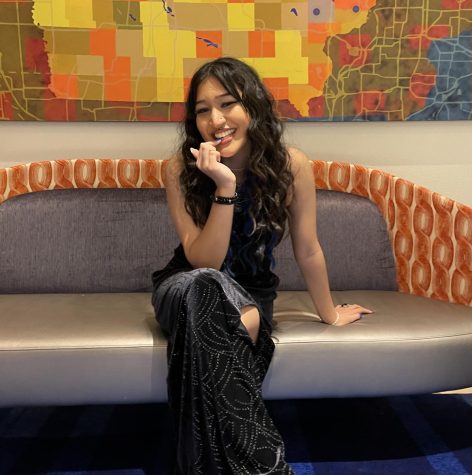Kanye West’s recent presence on Instagram has caused a stir among both die-hard fans and casual listeners. His posts with captions in all-capital letters wishing to be back with his ex-wife Kim Kardashian and their kids, putting comedian Pete Davidson on blast and sharing many more concerning statements about his struggles are creating a divide between those who support him and those who believe he is an insane and a cyberbully.
The situation surrounding West, Kardashian, Davidson and other celebrities is far more nuanced than people would like to acknowledge. West may not be a perfect person, but the demonization of his behavior by many audiences is evident of how society treats Black celebrities – especially those with mental health issues – and creates a spectacle out of them.
It would be naive to claim that West has done no wrong, but to only laugh at the situation is not harmless. Considering his behavior on Instagram since Feb. 9, the day he posted about wanting his family to be back together following Davidson and Kardashian’s relationship announcement, it is not surprising that many were concerned about him and the impact his actions may have on others.
West has been diagnosed with bipolar disorder and has spoken about it openly. While this does not excuse his behavior, it alters the conversation. Whether or not someone is a celebrity, is it all right for people to joke about them being “off their meds” or “insane, as many have been saying about West? Rather than laughing at their actions and finding them intriguing, is the main goal not to help them?
Senior Ashley Lindquist commented on the propriety of this phenomenon. “It is often not ethical. If you were to take it at a smaller scale, for example, if there was a popular person at your school and all of their personal information and their mental trauma was blasted around the school, that would not be okay. This situation is countrywide,” she said. “In America especially, it has become a main form of entertainment. Though it can be in a positive light due to its relatability, it often is not. You see that a lot in reality TV where people have mental breakdowns for the purpose of entertainment for the masses.”
When the individual’s status as a celebrity is attached to their perception by audiences, the situation at hand becomes even more complicated. Though many may argue that celebrities exist for the entertainment of the general public, whether that be through their art, business, social media presence or anything else, they are still humans. It is debatable whether it is natural for the public to create a spectacle out of famous people, but it is unethical to treat them as if they are not human beings like everyone else.
One of the most important parts of West’s identity as a celebrity with mental illness is his Blackness. The ins and outs of West’s specific situation are unknown to the public, but historically, Black people have been made to be a spectacle by non-Black America. An example of this are minstrel shows of the 19th and 20th centuries, in which white performers used blackface to mock and belittle Black people, all while generating profit off of the blatant racism.
It may seem like society has left this in the past, but several forms of this type of racism persist today. Digital blackface is a newly coined concept that stems from the historical act of stereotyping Black people, imitating them and profiting off of these actions. To this day, society finds enjoyment in making light of oppressed groups and identities and turning them into a form of entertainment.
It can be assumed that West experiences similar treatment by audiences. Many make the argument that West’s success as a musician somehow overrides his unique experience as a Black celebrity with mental illness, but that assertion only further proves how society mistreats him and his Black counterparts.
Historically, America has attempted to form an image with the certain unalienable rights of life, liberty and the pursuit of happiness, though it has failed to uphold those. Though Black History Month is more than halfway over, Black history has made up a large part of American history since the inception of the nation.
Before abolishing segregation in the country itself, America’s sports teams began integrating Black athletes into its national professional sports leagues. Though this was a huge accomplishment for minorities in America, it also showed American society’s shameless willingness to exploit the oppressed.
Many did not see these Black athletes as people but, rather, as pawns to help them win medals and provide entertainment, considering the averseness to progress being made outside of sports in civil rights. These people, such as Kenny Washington and Jackie Robinson, were only valued by American society to the extent of their athletic ability.
As soon as Black athletes tried to protest against this mistreatment, they received backlash and were even punished by removal from their respective teams, such as what happened with the 1968 Olympics Black power salute. Controversy within professional sports like this still exists as many criticize Black athletes who try to speak up through their professions, crying that politics do not belong in entertainment.
Black music artists who have both carried and invented the rap and hip hop industry are treated similarly by Americans. The average listener is eager to enjoy the music created by Black peoples’ labor and passion but not to support their rights outside of the sphere of entertainment.
This concept intersects with the spectacle that is made out of both celebrities and those with mental illnesses, creating a unique form of suffering and oppression faced by Black celebrities with mental illnesses.
An example of an internet personality who has experienced this is influencer Lovely Peaches. Several videos of her have gone viral for entertainment purposes, when she was clearly exhibiting erratic and possibly dangerous behavior. Society made a display out of her actions, when she could be hurting herself and others. To reiterate, her actions are not to be excused, but the manner in which people reacted to social media presence is inexcusable.
This connects back to West because, ultimately, he is a Black celebrity with mental health issues. Historically and currently, Black people have experienced racism in the medical industry. “I have been interested in medicine, and often, there seem to be misconceptions about pain tolerance,” Lindquist added. “Especially with mental health as well, with Black women for example, people act like their hormones are different, and that is absolutely false. People think that certain things are different between Black and white people when they are not.”
Medical racism is dehumanizing, and it makes addressing mental health issues far more difficult when mental health is stigmatized among society and even more within certain groups. “I think even within that, there are different cultural and group contexts that have placed boundaries on what can and cannot be talked about,” said girls track and field coach Kenny Wheeler. “It might silence an opportunity for one to discuss things that they are working through and negate the opportunity for support to be provided.”
Wheeler expanded the complexity of the topic by mentioning how gender also plays a role in the problem. “For example, how do males talk about mental health, and what does it mean to be ‘tough’ when men have been given the message to take everything on, not be sensitive, etc.? he said. “When it comes to Black males, the hip-hop industry, Black men growing up without fathers, where is there an avenue to explore mental health? And even then, who is listening?”
Senior and West fan Mitchell Wood discussed how Black mental health is not only neglected, but even criminalized. “Logically, when you take into account the general socioeconomic backgrounds of people of color in America, it is easy to connect the dots and point out that they likely have far less opportunities for mental health help,” he stated. “This not only worsens their mental problems, but it may possibly cause them to find themselves being punished legally instead of getting the correct help they need.”
Lindquist held a similar attitude towards this, explaining that “people who are Black and angry are often seen as more threatening than people who are white and angry.”
Unfortunately, while these crucial problems are worth understanding, the limitations of non-Black perspectives surrounding Black issues is a complication itself. At PV, the student population is overwhelmingly white with the majority of its minority population being Asian. The battle against oppressive stereotypes becomes very real, especially when the voices of the oppressed are drowned out in predominantly white spaces.
West remains as one of the most talented, influential and celebrated American musicians of his time, and his legacy should never be undermined nor forgotten. “I consider myself a huge fan of Kanye both as a person and an artist,” Wood acknowledged. “Not only do I love his music, but the way he channels his creativity into his craft is inspiring. Through all of the trials and tribulations he has gone through to prove to the world his genius, I cannot help but admire the person he is as well.”
Before he is an artist, a businessman, a celebrity, someone with mental health issues or Black, West is a human who deserves agency and empathy. What he has given the world through his career cannot be accepted without all of the struggles that have accompanied him due to the intersection of his several identities, and to do so would be dehumanizing.
America should not infantilize him by not holding him accountable for his actions, but to deny the spectacle it has made out of his seemingly irrational behavior and that of other Black celebrities with mental health issues would not be the nation’s first weak, racist lie.









